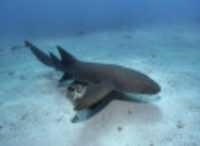While humans evolved to have the largest brain-to-body-size ratio, supposedly making us one of the smartest animals on Earth, we also evolved to be the most destructive.
In 1950 there were 2.5 billion people on Earth, and we created 1.5 million tons of plastic per year. Now there are 7.4 billion people on Earth - a five-fold increase; yet, we create over 300 million tons of plastic each year, a 200-fold difference.
Not only that, but, since 1950, we have also over-fished nearly every inch of our oceans.
So, what does this have to do with the difference between animals and ourselves?
The major difference is that (**most**) animals consume or eat for survival, they kill only what they need to live. That might mean a pod of Orcas kills one seal, or a pride of lions kills one Impala.
Humans, on the other hand, kill indiscriminately.
When we fish in our oceans, we don't just get the one species we are looking for. We trawl the bottom of the ocean killing everything in our path, corals or bottom-dwelling creatures, and irresponsibly catch and kill multiple unintended species of fish, invertebrates, sea mammals such as dolphins, porpoises, or whales, and sometimes, even seabirds.
Our search for oil damages marine habitats, food chains, health, and also may damage the sensitive hearing of marine animals, making it difficult for them to find food, or communicate, and may even cause mass strandings or death from starvation as animals become confused, overwhelmed, or disoriented from the cacophony.
Meanwhile on land, we are destructive in a myriad of other ways: We clear-cut forests, build cities, disrupt waterway, infiltrate and destroy habitats, and indiscriminately kill, again.
Hundreds of thousands of elephants, rhinoceros, tigers, and other endangered species are killed every year for their "medicinal" "purposes, or to demonstrate wealth; and, many of these animals are on the brink of extinction, and may become extinct within the next decade.
The true wealth on our planet is the animals. Their lives. It is what they give to the planet and to each other as part of an intricate web, they have figured out already. They've been here a lot longer than we have.
They know how to live in harmony, and take only what they need.
They know the importance of returning to the land what they take, reaping what they sow, and do not kill without reason.
We may have the largest brains, but I argue that we are not the smartest.
If we would just start paying attention, we would learn so much from our fellow animals about conservation, relationship building, giving back to the earth, and perhaps most importantly contributing to the web in which we are also a part of.
They were here long before we were, yet, we are killing them, and altering the planet faster than they can adapt.
By 2050 it is estimated that more than half of all species on the planet will be extinct, by our hands.
By 2050, It is expected that there will be more plastic in the ocean and fish.
These to me are scary statistics. It is time to stem the wave of destruction, and instead to be leaders and advocates for conservation.
1. If you eat seafood, look only for sustainable sources, that our line-caught, meaning they use traditional, discriminate fishing methods.
2. Write your congressmen and senators.
3. Educate others by Sharing this blog and others like it.
4. Eliminate or significantly reduce your intake of animal products - treat them as a condiment, not a main. For more specific meal suggestions and recipes, please refer to my previous post: "Why Plants are This Summer's "Coolest" Diet."
5. Read and review your food labels, because, it is possible that there are ingredients in them that are unsustainable (such as coconut or palm kernel oil - which destroy several habitats) and or possibly shark fin or cartilage.
6. Give up your fish oil in lieu of plant sources of omega-3 black, such as flax, walnut, and algal sources.
7. Encourage your local coffee shop to invest in eco-lids and cups that are compostable.
8. Reduce your food waste, buy only what you need, cook it, and eat it or store it in a way that it won't go bad. Food storage tips.
To contact Dana: recipe.for.survival@gmail.com
Twitter: recipe4survival
Facebook: https://www.facebook.com/RecipeForSurvival/
blog: recipeforsurvival.wordpress.com

